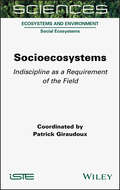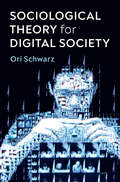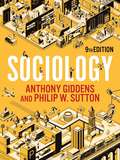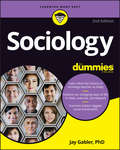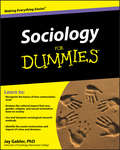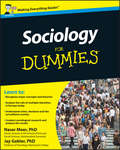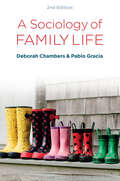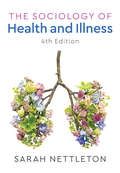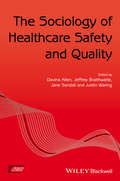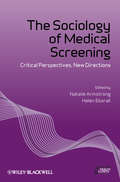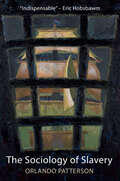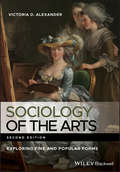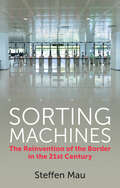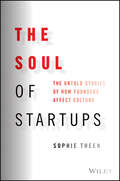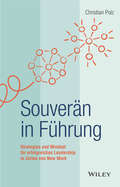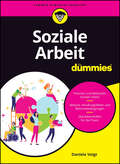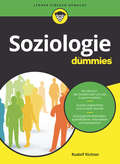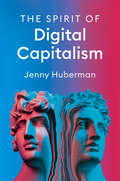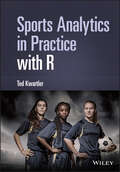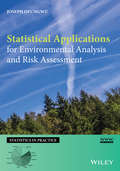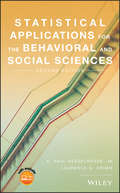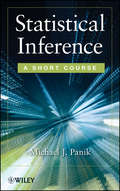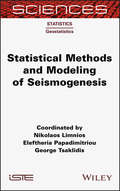- Table View
- List View
Socioecosystems: Indiscipline as a Requirement of the Field
by Patrick GiraudouxThe idea of socioecosystems answers the growing need to understand, in the context of the Anthropocene, how adaptive processes interact, and how that interplay results in the coevolution of living beings. Studying socioecosystems means taking into account the diversity of temporal and physical scales in order to grasp how ecological, social and economic forces are interwoven. Based on these drivers, the complex dynamics that determine the habitability of the Earth emerge. This book analyzes, through concrete cases from regional socioecosystems on several continents, how research action has provided answers to problems related to agriculture, health and the conservation of biodiversity. It demonstrates that these undertakings could not have succeeded without the combined efforts of the communities of living beings and objects, the community of knowledge and the communities of action. These examples are accompanied by a reflection on the conditions that make it possible to bring this research to completion.
Sociolinguistic Styles
by Juan Manuel Hernández-CampoySociolinguistic Styles presents a new and in-depth, historically rooted overview of the phenomenon of style-shifting in sociolinguistic variation. Written by an internationally acclaimed expert in the field, the text explores why, where and when it occurs. Full examination of the complex phenomenon of style-shifting in sociolinguistics, focusing on its nature and social motivations, as well as on the mechanisms for its usage and its effects In-depth, up-to-date critical overview of the different theoretical approaches accounting for stylistic variation, exploring their historical roots not only in sociolinguistics and stylistics or semiotics but also in classical fields such as rhetoric and oratory Coverage of a wide range of related concepts and issues, from the oldest Greek ethos and pathos or Roman elocutio and pronuntiatio to the contemporary enregisterment, stylisation, stance, or crossing Written by an academic who has been instrumental in developing theory in this area of sociolinguistics
Sociological Theory for Digital Society: The Codes that Bind Us Together
by Ori SchwarzThe digital revolution has not only transformed multiple aspects of social life – it also shakes sociological theory, transforming the most basic assumptions that have underlain it. In this timely book, Ori Schwarz explores the main challenges digitalization poses to different strands of sociological theory and offers paths to adapt them to new social realities. What would symbolic interactionism look like in a world where interaction no longer takes place within bounded situations and is constantly documented as durable digital objects? How should we understand new digitally mediated forms of human association that bind our actions and lives together but have little in common with old-time 'collectives'; and why are they not simply ‘social networks’? How does social capital transform when it is materialized in a digital form, and how does it remould power structures? What happens to our conceptualization of power when faced with the emergence of new forms of algorithmic power? And what happens when labour departs from work? By posing and answering such fascinating questions, and offering critical tools for both students and scholars of social theory and digital society to engage with them, this thought-provoking book draws the outline of future sociological theory for our digital society.
Sociology: Introductory Readings
by Anthony Giddens Philip W. SuttonThe indispensable guide to understanding the world we make and the lives we lead. This thoroughly revised and updated ninth edition remains unrivalled in its vibrant, engaging and authoritative introduction to sociology. The authors provide a commanding overview of the latest global developments and new ideas in this fascinating subject. Classic debates are also given careful coverage, with even the most complex ideas explained in a straightforward way. Written in a fluent, easy-to-follow style, the book manages to be intellectually rigorous but still very accessible. With a strong focus on interactive pedagogy, it aims to engage and excite readers, helping them to see the enduring value of thinking sociologically. The ninth edition includes: a solid foundation in the basics of sociology: its purpose, methodology and theories; up-to-the-minute overviews of key topics in social life, from gender, personal life and poverty, to globalization, the media and politics; stimulating examples of what sociology has to say about key issues in our contemporary world, such as climate change, growing inequality and rising polarization in societies across the world; a strong focus on global connections and the ways that digital technologies are radically transforming our lives; quality pedagogical features, such as ‘Classic Studies’ and ‘Global Society’ boxes, and ‘Thinking Critically’ reflection points, as well as end-of-chapter activities inviting readers to engage with popular culture and original research articles to gather sociological insights. The ninth edition sets the standard for introductory sociology in a complex world. It is the ideal teaching text for first-year university and college courses, and will help to inspire a new generation of sociologists.
Sociology For Dummies
by Jay GablerUnderstand how society works—and how to make it betterIt’s impossible to exist in the contemporary world without being aware that powerful social forces, ideas, and movements—#MeToo, climate change, and Black Lives Matter to name just a few—are having far-reaching impacts on how we think and live. But why are they happening? And what are their likely effects? The new edition of Sociology For Dummies gives you the tools to step back from your personal experience and study these questions objectively, testing the observable phenomena of the human world against established theories and making usable sense of the results.In a friendly, jargon-free style, sociologist and broadcaster Jay Gabler introduces you to sociology’s history and basic methods, and—once you have your sociological lens adjusted—makes it clear how to survey the big questions of culture, gender, ethnicity, religion, politics, and crime with new eyes. You’ll find everything you need to succeed in an introductory sociology class, as well as to apply sociological ideas to give you extra insight into your personal and professional life. Get a working knowledge of Sociology 101 Understand how human communities work Engage more deeply with debates on social justice, healthcare, and more Interpret and use sociological methods and research Whether you’re studying sociology at school or just want to gain deeper insight into our collective life, Sociology For Dummies gives you the tools to understand the mechanisms of the human world—and the knowledge to influence how they work for the better.
Sociology For Dummies
by Jay GablerThe first authoritative yet accessible guide to this broad and popular topicSociology is the study of human and societal interaction, and because society is constantly changing, sociology will always remain a crucial and relevant subject. Sociology For Dummies helps you understand this complex field, serving as the ideal study guide both when you're deciding to take a class as well as when you are already participating in a course.Provides a general overview of what sociology in as well as an in-depth look at some of the major concepts and theoriesOffers examples of how sociology can be applied and its importance to everyday lifeAvoiding jargon, Sociology For Dummies will get you up to speed on this widely studied topic in no time.
Sociology For Dummies
by Nasar Meer Jay GablerSociology For Dummies helps you understand the complex field of sociology, serving as the ideal study guide both when you're deciding to take a class as well as when you are already participating in a course. Avoiding jargon, Sociology For Dummies will get you up to speed on this widely studied topic in no time.Sociology For Dummies, UK Edition:Provides a general overview of what sociology is as well as an in-depth look at some of the major concepts and theories. Offers examples of how sociology can be applied and its importance to everyday life Features an in-depth look at social movements and political sociology Helps you discover how to conduct sociological research Offers advice and tips for thinking about the world in an objective way
A Sociology of Family Life: Change and Diversity in Intimate Relations
by Deborah Chambers Pablo GraciaFamily relations are undergoing dramatic changes globally and locally. At the same time, certain features of family life endure. This popular book, now in a fully updated second edition, presents a comprehensive assessment of recent research on 'family', parenting, childhood and interpersonal ties. A Sociology of Family Life queries assumptions about a disintegration of 'the family' by revealing a remarkable persistence of commitment and reciprocity across cultures, within new as well as traditional family forms. Yet, while new kinds of intimate relationships such as 'friends as family' and LGBTQ+ intimacies become commonplace, such personal relationships can still be difficult to negotiate in the face of wider structural norms. With a focus on factors such as class, gender, race, ethnicity and sexuality, this new edition highlights inequalities that influence and curb families and personal life transnationally. Alongside substantial new material on cultural and digital transformations, the book features extensive updates on issues ranging from demography, migration, ageing and government policies to reproductive technologies, employment and care. With a global focus, and blending theory with real-life examples, this insightful and engaging book will remain indispensable to students across the social sciences.
The Sociology of Health and Illness
by Sarah NettletonSarah Nettleton’s The Sociology of Health and Illness has become a cornerstone text, popular with students and academics alike for its rigorous and accessible overview of the field. Building on these strengths, the fourth edition integrates fresh insights from the current literature with the core tenets of traditional medical sociology, providing students with a thorough grounding in the sociology of health and illness. The text covers a diversity of topics and draws on a wide range of analytic approaches, spanning issues such as the social construction of medical knowledge, the analysis of lay health beliefs, concepts of lifestyles and risk, the experience of illness and the sociology of the body. It also explores matters that are central to health policy, such as professional–patient relationships, health inequalities and the changing nature of health care work. A new chapter has been added, on the sociology of mental health; other chapters have been updated with illustrative examples and questions for discussion. Written for students of the social sciences, this book will also appeal to students taking vocational degrees, such as nursing, medicine and public health, who require a sociological grounding in the area. Thoroughly revised and fully updated, this fourth edition will prove invaluable to anyone looking for a clear and engaging introduction to contemporary debates within the sociology of health and illness.
The Sociology of Healthcare Safety and Quality
by Jeffrey Braithwaite Jane Sandall Justin Waring Davina AllenThe Sociology of Healthcare Safety and Quality presents a series of research-informed readings on the sociological contributions of technologies, practices, experiences, and organizational quality and safety across a range of healthcare contexts. Represents the first collection of peer-reviewed research articles showcasing ways that sociology can contribute to the ongoing policy concern of healthcare safety and quality Features original contributions from leading experts in healthcare related fields from three continents Reveals the state-of-the art in sociological analyses of contemporary healthcare safety and quality along with future directions in the field Offers sociological insights from the perspectives of managers, clinicians, and patients
The Sociology of Medical Screening: Critical Perspectives, New Directions (Sociology of Health and Illness Monographs #17)
by Natalie Armstrong Helen EborallThe Sociology of Medical Screening: Critical Perspectives, New Directions presents a series of readings that provide an up-to-date overview of the diverse sociological issues relating to population-based medical screening. Features new research data in most of the contributions Includes contributions from eminent sociologists such as David Armstrong, Stefan Timmermans, and Alison Pilnick Represents one of the only collections to specifically address the sociology of medical screening
The Sociology of Slavery: Black Society in Jamaica, 1655-1838
by Orlando PattersonOrlando Patterson’s classic study of slavery in Jamaica reveals slavery for what it was: a highly repressive and destructive system of human exploitation, which disregarded and distorted almost all of the basic prerequisites of normal social life. What distinguishes Patterson's account is his detailed description of the lives and culture of slaves under this repressive regime. He analyses the conditions of slave life and work on the plantations, the psychological life of slaves and the patterns and meanings of life and death. He shows that the real-life situation of slaves and enslavers involved a complete breakdown of all major social institutions, including the family, gender relations, religion, trust and morality. And yet, despite the repressiveness and protracted genocide of the regime, slaves maintained some space of their own, and their forced adjustment to white norms did not mean that they accepted them. Slave culture was characterized by a persistent sense of resentment and injustice, which underpinned the day-to-day resistance and large-scale rebellions that were a constant feature of slave society, the last and greatest of which partly accounts for its abolition. This second edition includes a new introduction by Orlando Patterson, which explains the origins of the book, appraises subsequent works on Jamaican slavery, and reflects on its enduring relevance. Widely recognized as a foundational work on the social institution of slavery, this book is an essential text for anyone interested in the role of slavery in shaping the modern world.
Sociology of the Arts: Exploring Fine and Popular Forms (Sociology Of The Arts Ser.)
by Victoria D. AlexanderExplains the key concepts, theories, and studies in the sociology of the arts—the fully updated new edition of the classic textbook Sociology of the Arts is a comprehensive yet accessible review of sociological approaches to studying the fine, popular, and folk arts. Integrating scholarly literature, theoretical models, and empirical studies, this authoritative textbook provides balanced coverage of a broad range of essential topics—enabling a deeper understanding of the field as a whole. Throughout the text, numerous real-world case studies reinforce key concepts, stimulate classroom discussion, and encourage students to contemplate abstract theoretical issues central to the relationship between art and society. Now in its second edition, this bestselling volume features fully revised content that reflects the most recent literature and research in the field. New discussion on the production and the consumption of culture are complemented by fresh perspectives on changes in the social world such as the rise of the internet and digital media. Updated chapters offer insights into social boundaries and embodiment in the arts, emplacement, materiality, the social construction of art and aesthetics, and more. Exploring how art is created, distributed, received, and consumed, this textbook: Explores both classic work and new approaches in the sociology of the arts Features case studies and discussion questions on art forms including popular music, film, romance novels, visual arts, and classical music Discusses the meaning of artistic objects and why interpretations of art vary Examines the ways art intersects with race, gender, sexuality, and class Includes photographs, tables and figures, and a comprehensive reference list Written by a leading scholar in the field, Sociology of the Arts: Exploring Fine and Popular Forms, Second Edition is an ideal textbook for advanced undergraduate and graduate courses on sociology of art and culture, media studies, anthropology of art, arts management, and the social history of art, and is a useful reference for established scholars studying any aspect of sociology of the arts.
Sorting Machines: The Reinvention of the Border in the 21st Century
by Steffen MauIt is commonly thought that, thanks to globalization, nation-state borders are becoming increasingly porous. Steffen Mau shows that this view is misleading: borders are not getting more permeable today, but rather are being turned into powerful sorting machines. Supported by digitalization, they have been upgraded to smart borders, and border control has expanded spatially on a massive scale. Mau shows how the new sorting machines create mobility and immobility at the same time: for some travellers, borders open readily, but for others they are closed more firmly than ever. While a small circle of privileged people can travel almost anywhere today, the vast majority of the world’s population continues to be systematically excluded. Nowhere is the Janus nature of globalization more evident than at the borders of the 21st century.
The Soul of Startups: The Untold Stories of How Founders Affect Culture
by Sophie TheenDiscover how a founder&’s personality can impact the culture of a startup In The Soul of Startups: The Untold Stories of How Founders Affect Culture, award-winning HR and diversity and inclusion professional Sophie Theen delivers an insightful and eye-opening discussion of the importance of culture in the vibrant and, sometimes, chaotic world of startup enterprise. In the book, you&’ll hear from a people management expert who has sat alongside those who launch exciting new ventures. The author describes company founders who lacked the emotional maturity and intelligence to start an organization on which an entire team would rely for their wellbeing, as well as those who excelled at creating environments that allowed their team members to thrive, personally and professionally. You&’ll also find: Unvarnished truths from people who have lived through the ups and downs of the startup experience Celebrations of the people who have worked for—and with—the celebrity CEOs to help them realize their vision Illuminating stories of the journeys of startup operators, including the good, the bad, and the uglyA can&’t-miss resource for company founders, entrepreneurs, managers, executives, and startup professionals, The Soul of Startups also belongs in the libraries of human resources and people management professionals seeking unique insights into how the personalities of startup founders shape the structures, processes, and realities of working in a fast-growing company.
Souverän in Führung: Strategien und Mindset für erfolgreiches Leadership in Zeiten von New Work
by Christian PolzNichts ist, wie es mal war. Die Herausforderungen der modernen Arbeitswelt erfordern es, Führung neu zu denken, neu zu justieren und neu auszurichten. Der Autor beschreibt in seinem praxisorientierten Ratgeber, wie Führung heute und zukünftig gelingt. Im Fokus steht das Collective Leadership: Jeder im Unternehmen, jeder in der Abteilung und jeder im Team übernimmt Verantwortung. Will, darf und soll Verantwortung übernehmen. "Wir sind alle Leader!", so das Leitmotiv. Wer Collective Leadership etablieren will, durchläuft einen Entwicklungsprozess. Collective Leadership bedeutet Mitarbeiter, die sich selbst führen können und wollen, aber es gibt auch Mitarbeiter und Situationen, in denen die Führungskraft zum Beispiel direktiv oder transaktional agieren muss. Sie muss beides können und darum Führungssouveränität und Führungsstilsouveränität aufbauen. Dazu gehört auch das entsprechende Mindset. Zu diesem Mindset gehört, die Auseinandersetzung mit dem eigenen Menschenbild, den Kompetenzen und Fähigkeiten (Stichwort Selbstreflexion). Christian Polz stellt die Entwicklung zur souveränen Führungspersönlichkeit und zu Collective Leadership in drei Teilen dar: Der Beschreibung des Konzepts des souveränen Führens folgt die Erläuterung des dazu notwendigen Mindsets. Im dritten Teil steht die Umsetzung im Vordergrund. Neben der Darstellung des Konzeptes des souveränen Führens und des Mindsets der souveränen Führungspersönlichkeit bietet dieser Umsetzungsteil ein Highlight. Dort veranschaulicht Christian Polz die wichtigsten Führungsansätze und Führungsstile in einem fiktiven Dialog zwischen einem Coach und einer "lernenden" Führungskraft. Der Autor nutzt seine Erfahrungen und zahlreichen Gespräche mit Unternehmern, Inhabern, Selbstständigen, Vorständen, Geschäftsführern, Managern und Führungskräften, um ein authentisches und realistisches Bild einer neuen Führung zu kreieren. Dazu arbeitet er mit vielen Beispielen aus seinem Erfahrungsschatz, den er als Berater, Coach, Trainer und Supervisor aufgebaut hat.
Soziale Arbeit für Dummies (Für Dummies)
by Daniela VoigtSozial — Alles, was Sozialarbeiter schon immer wissen wollten Ein Buch für Studierende und Sozialarbeiter, das einen wunderbaren Überblick über das Thema gibt und dabei Theorie und Praxis verbindet. Sie lernen Hand-lungsfelder, Akteure und Rahmenbedingungen der Sozialen Arbeit kennen und gewinnen ein Grundverständnis von Methoden und Theorien. Zugleich erhalten Sie für Ihren Arbeitsalltag als Sozialarbeiter Survival Hacks und Überlebenstipps. Daniela Voigt erklärt verständlich und anhand vieler anschaulicher Beispiele, was Soziale Arbeit ausmacht und wie sie dazu beitragen kann, Menschen zu unterstützen, gesellschaftliche Probleme zu lösen und die Welt ein wenig sozialer und gerechter zu machen. Sie erfahren Was die Arbeit mit Menschen so speziell macht Welche Methoden Ihnen helfen, Hilfe zur Selbsthilfe zu geben Was den idealtypischen Sozialarbeiter ausmacht Wissenswertes über die Entstehung der Sozialen Arbeit
Soziologie für Dummies (Für Dummies)
by Rudolf RichterDieses Buch bietet einen Einblick in die Soziologie, ihre Theorien und Methoden. Rudolf Richter erklärt, wie die Soziologie Individuen und ihre Beziehungen zueinander betrachtet, und zeigt auf, wie diese Wechselwirkungen zu Gewohnheiten und Regeln, zu Systemen und Institutionen werden. Lernen Sie, was eine Gesellschaft ausmacht. Erfahren Sie, welche empirische Methoden und statistischen Auswertungen Soziologen nutzen, um soziale Strukturen sichtbar zu machen und zu erklären. Lassen Sie sich erklären, wie sich der quantitative Ansatz vom qualitativen unterscheidet. Tauchen Sie ein in die spannende Welt der Soziologie!
The Spirit of Digital Capitalism
by Jenny HubermanDigital technologies are now central to the machinations of capitalism. How are they giving rise to new forms of capital accumulation and domination? And in what terms are these changes being promoted and justified by a new and incredibly powerful elite? This book takes on such questions. Beyond demonstrating how digital technologies make new forms of capital accumulation possible, Huberman interrogates the ideological transformations that have accompanied the emergence of digital capitalism. She examines how business gurus, entrepreneurs, and venture capitalists make claims about how digital technologies contribute to the common good, foster collaboration and connectivity, and render life more convenient, even if this convenience comes at the expense of values such as privacy and liberty. Ultimately, Huberman argues that the spirit of digital capitalism is Janus-faced and reveals deeper cultural contradictions at the heart of contemporary American society: promising, in the same moment, to liberate us and surveil us, enrich us, and yet render our lives more economically precarious. Smart and thought-provoking, this book offers new perspectives that will speak to anyone interested in the contours of contemporary capitalism, particularly students and scholars of economic anthropology and sociology.
Sports Analytics in Practice with R
by Ted KwartlerSports Analytics in Practice with R A practical guide for those looking to employ the latest and leading analytical software in sport In the last twenty years, sports organizations have become a data-driven business. Before this, most decisions in sports were qualitatively driven by subject-matter experts. In the years since numerous teams found success with “Money Ball” analytical perspectives, the industry has sought to advance its analytical acumen to improve on- and off-field outcomes. The increasing demand for data to inform decisions for coaches, scouts, and players before and during sporting events has led to intriguing efforts to build upon this quantitative approach. As this methodology for assessing performance has matured and grown in importance, so too has the open-source R software emerged as one of the leading analytical software packages. In fact, R is a top 10 programming language that is useful in academia and industry for statistics, machine learning, and rapid prototyping. Sports Analytics in Practice with R neatly marries these two advances to teach basic analytics for sports-related use—from cricket to baseball, from basketball to tennis, from soccer to sports gambling, and more. Sports Analytics in Practice with R readers will also find: A broad perspective of sports, focusing on a wide range of sports rather than just one The first book of its kind that features coding examples Case study approach throughout the book Companion website including data sets to work through alongside the explanations Sports Analytics in Practice with R is a helpful tool for students and professionals in the sports management field, but also for sports enthusiasts who have a coding background.
Statistical Applications for Environmental Analysis and Risk Assessment
by Joseph OfungwuStatistical Applications for Environmental Analysis and Risk Assessment guides readers through real-world situations and the best statistical methods used to determine the nature and extent of the problem, evaluate the potential human health and ecological risks, and design and implement remedial systems as necessary. Featuring numerous worked examples using actual data and "ready-made" software scripts, Statistical Applications for Environmental Analysis and Risk Assessment also includes:* Descriptions of basic statistical concepts and principles in an informal style that does not presume prior familiarity with the subject* Detailed illustrations of statistical applications in the environmental and related water resources fields using real-world data in the contexts that would typically be encountered by practitioners* Software scripts using the high-powered statistical software system, R, and supplemented by USEPA's ProUCL and USDOE's VSP software packages, which are all freely available* Coverage of frequent data sample issues such as non-detects, outliers, skewness, sustained and cyclical trend that habitually plague environmental data samples* Clear demonstrations of the crucial, but often overlooked, role of statistics in environmental sampling design and subsequent exposure risk assessment.
Statistical Applications for the Behavioral and Social Sciences
by Laurence G. Grimm K. Paul Nesselroade JrAn updated edition of a classic text on applying statistical analyses to the social sciences, with reviews, new chapters, an expanded set of post-hoc analyses, and information on computing in Excel and SPSS Now in its second edition,Statistical Applications for the Behavioral and Social Sciences has been revised and updated and continues to offer an essential guide to the conceptual foundations of statistical analyses (particularly inferential statistics), placing an emphasis on connecting statistical tools with appropriate research contexts. Designed to be accessible, the text contains an applications-oriented, step-by-step presentation of the statistical theories and formulas most often used by the social sciences. The revised text also includes an entire chapter on the basic concepts in research, presenting an overall context for all the book’s statistical theories and formulas. The authors cover descriptive statistics and z scores, the theoretical underpinnings of inferential statistics, z and t tests, power analysis, one/two-way and repeated-measures ANOVA, linear correlation and regression, as well as chi-square and other nonparametric tests. The second edition also includes a new chapter on basic probability theory. This important resource: • Contains information regarding the use of statistical software packages; both Excel and SPSS • Offers four strategically positioned and accumulating reviews, each containing a set of research-oriented diagnostic questions designed to help students determine which tests are applicable to which research scenarios • Incorporates additional statistical information on follow-up analyses such as post-hoc tests and effect sizes • Includes a series of sidebar discussions dispersed throughout the text that address, among other topics, the recent and growing controversy regarding the failed reproducibility of published findings in the social sciences • Puts renewed emphasis on presentation of data and findings using the APA format • Includes supplementary material consisting of a set of “kick-start” quizzes designed to get students quickly back up to speed at the start of an instructional period, and a complete set of ready-to-use PowerPoint slides for in-class use Written for students in areas such as psychology, sociology, criminology, political science, public health, and others, Statistical Applications for the Behavioral and Social Sciences, Second Edition continues to provide the information needed to understand the foundations of statistical analyses as relevant to the behavioral and social sciences.
Statistical Approaches for Hidden Variables in Ecology
by Nathalie Peyrard Olivier GimenezThe study of ecological systems is often impeded by components that escape perfect observation, such as the trajectories of moving animals or the status of plant seed banks. These hidden components can be efficiently handled with statistical modeling by using hidden variables, which are often called latent variables. Notably, the hidden variables framework enables us to model an underlying interaction structure between variables (including random effects in regression models) and perform data clustering, which are useful tools in the analysis of ecological data.This book provides an introduction to hidden variables in ecology, through recent works on statistical modeling as well as on estimation in models with latent variables. All models are illustrated with ecological examples involving different types of latent variables at different scales of organization, from individuals to ecosystems. Readers have access to the data and R codes to facilitate understanding of the model and to adapt inference tools to their own data.
Statistical Inference
by Michael J. PanikA concise, easily accessible introduction to descriptive and inferential techniquesStatistical Inference: A Short Course offers a concise presentation of the essentials of basic statistics for readers seeking to acquire a working knowledge of statistical concepts, measures, and procedures.The author conducts tests on the assumption of randomness and normality, provides nonparametric methods when parametric approaches might not work. The book also explores how to determine a confidence interval for a population median while also providing coverage of ratio estimation, randomness, and causality. To ensure a thorough understanding of all key concepts, Statistical Inference provides numerous examples and solutions along with complete and precise answers to many fundamental questions, including:How do we determine that a given dataset is actually a random sample?With what level of precision and reliability can a population sample be estimated?How are probabilities determined and are they the same thing as odds?How can we predict the level of one variable from that of another?What is the strength of the relationship between two variables?The book is organized to present fundamental statistical concepts first, with later chapters exploring more advanced topics and additional statistical tests such as Distributional Hypotheses, Multinomial Chi-Square Statistics, and the Chi-Square Distribution. Each chapter includes appendices and exercises, allowing readers to test their comprehension of the presented material.Statistical Inference: A Short Course is an excellent book for courses on probability, mathematical statistics, and statistical inference at the upper-undergraduate and graduate levels. The book also serves as a valuable reference for researchers and practitioners who would like to develop further insights into essential statistical tools.
Statistical Methods and Modeling of Seismogenesis
by Nikolaos Limnios Eleftheria Papadimitriou George TsaklidisThe study of earthquakes is a multidisciplinary field, an amalgam of geodynamics, mathematics, engineering and more. The overriding commonality between them all is the presence of natural randomness. Stochastic studies (probability, stochastic processes and statistics) can be of different types, for example, the black box approach (one state), the white box approach (multi-state), the simulation of different aspects, and so on. This book has the advantage of bringing together a group of international authors, known for their earthquake-specific approaches, to cover a wide array of these myriad aspects. A variety of topics are presented, including statistical nonparametric and parametric methods, a multi-state system approach, earthquake simulators, post-seismic activity models, time series Markov models with regression, scaling properties and multifractal approaches, selfcorrecting models, the linked stress release model, Markovian arrival models, Poisson-based detection techniques, change point detection techniques on seismicity models, and, finally, semi-Markov models for earthquake forecasting.
